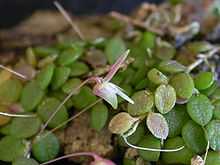Barbosella crassifolia
From Wikipedia, the free encyclopedia
| Barbosella crassifolia | |
|---|---|
 | |
| Scientific classification | |
| Kingdom: | Plantae |
| (unranked): | Angiosperms |
| (unranked): | Monocots |
| Order: | Asparagales |
| Family: | Orchidaceae |
| Subfamily: | Epidendroideae |
| Tribe: | Epidendreae |
| Subtribe: | Pleurothallidinae |
| Genus: | Barbosella |
| Species: | B. crassifolia |
| Binomial name | |
| Barbosella crassifolia (Edwall) Schltr. (1918) | |
| Synonyms | |
| |
Barbosella crassifolia is a species of orchid.
Location
Found in southern and eastern Brazil in dense primary forests at an elevation of 950 to 1500 meters.
Characteristics
Barbosella crassifolia is a miniature sized, warm to cool growing, mat forming epiphyte with ascending ramicauls enveloped by a thin, tubular sheath and carrying a single, apical, prostrate, thickly coriaceous, suborbicular to elliptical, entire apically, obtuse rounded, rounded and contracted below into the nearly absent petiolate base leaf that blooms in the late winter and early spring on a slender, erect, 0.6 to 1.12" [1.5 to .8 cm] long, single flowered inflorscence with a minute bract below the middle and an oblique floral bract.
| Wikimedia Commons has media related to Barbosella crassifolia. |
This article is issued from Wikipedia. The text is available under the Creative Commons Attribution/Share Alike; additional terms may apply for the media files.